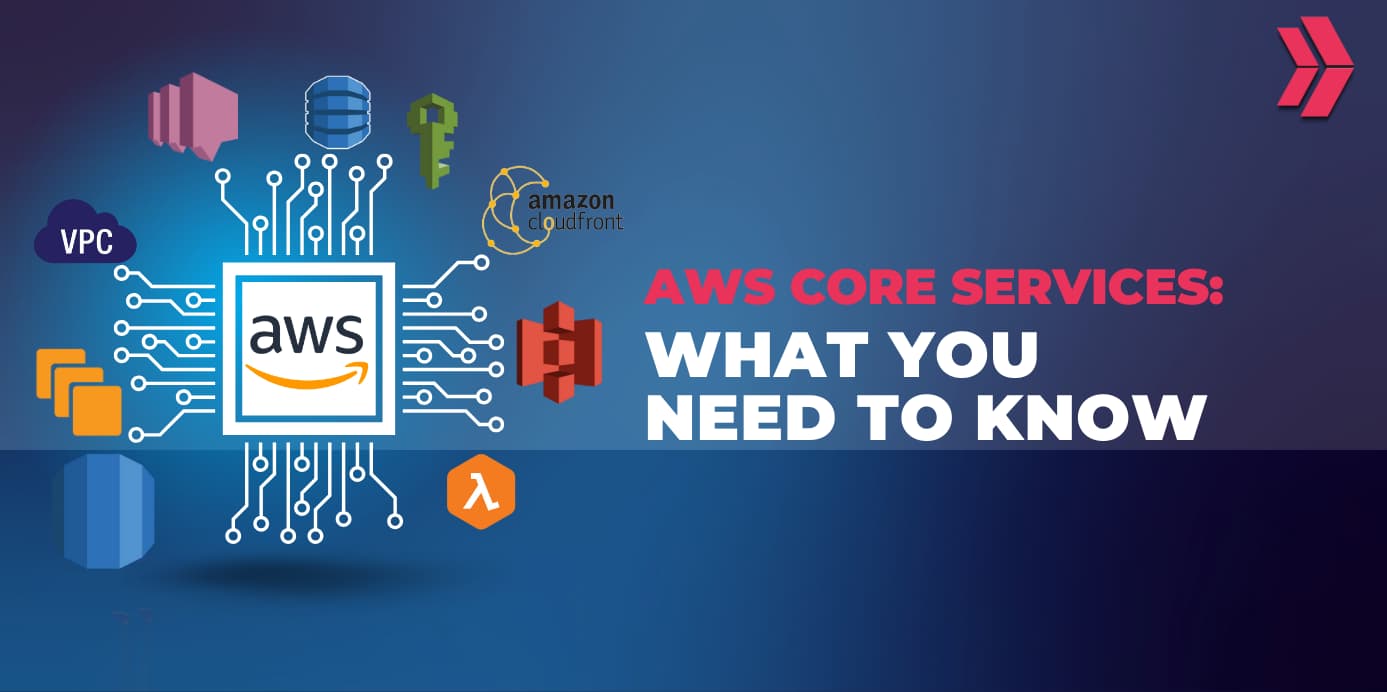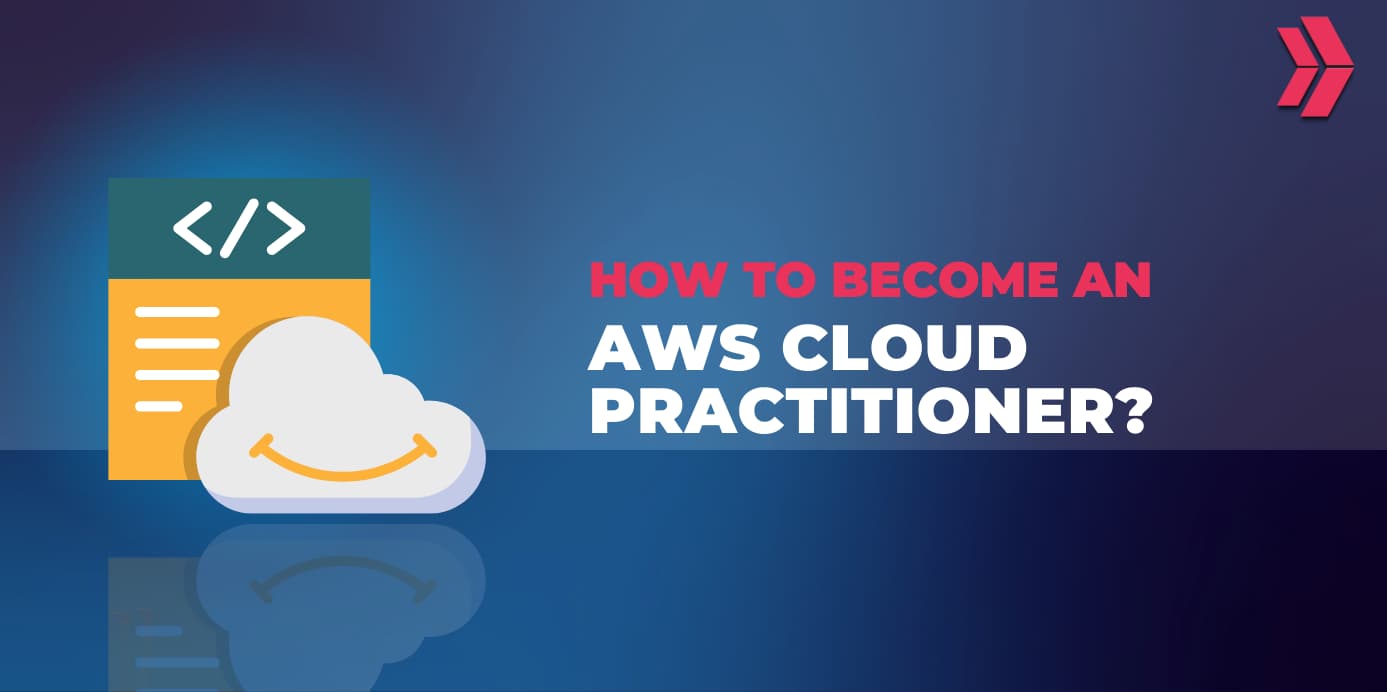Today, advancements in cloud computing are reshaping business operations, consistently delivering innovative solutions and transformative benefits across various sectors. Considering industry reports, expert analysis, and cloud service providers’ opinions, the global public cloud services market is poised for rapid growth.
Gartner forecasts that by 2024, the cloud market could grow at a compound annual growth rate of 18.4%, reaching $501.3 billion. This highlights the growing importance and critical need for individuals to gain expertise through AWS certification, preparing them to become leaders in this evolving environment.
In the coming sections, we’ll explore the details of AWS certifications, outline the various pathways and courses, and highlight important tips for maximizing your success in achieving these credentials.
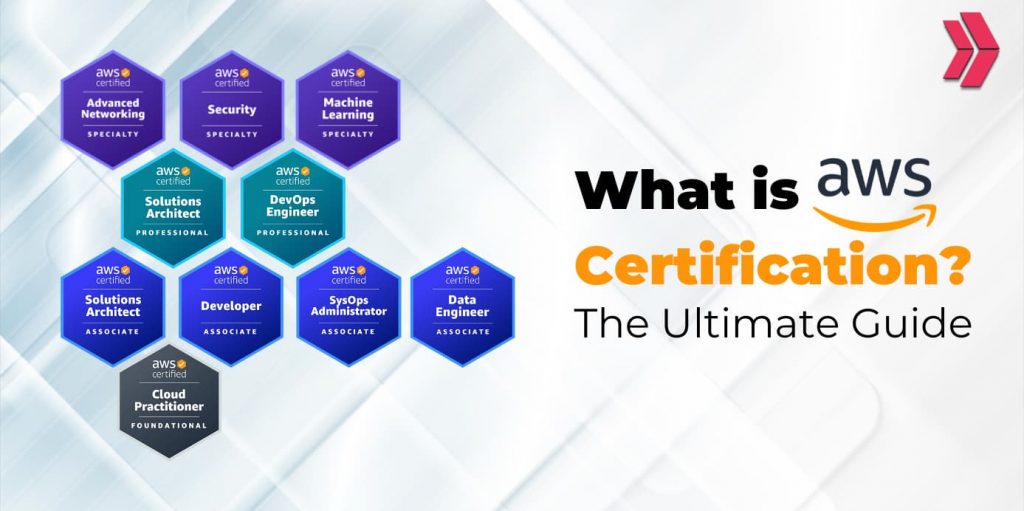
What is AWS Certification?
AWS certification involves a series of exams administered by Amazon Web Services to validate an individual’s expertise in the AWS cloud technology. These certifications are designed to uphold industry standards and ensure professionals possess adequate technical knowledge and skills to handle cloud-related tasks effectively.
The certifications cover a wide range of roles and specialties, including but not limited to Solutions Architects, Developers, Operations roles, and specialty areas like Advanced Networking, Big Data, Security, and Machine Learning. This structured path allows individuals to demonstrate their technical skills in specific cloud domains, thereby boosting their employability and professional growth.
Why is AWS Certification Important?
AWS Certification stands out as a critical benchmark for validating the expertise and skills necessary to navigate the complex AWS ecosystem. Earning an AWS Certification demonstrates a commitment to professional growth and continuous learning. Here are the key benefits of AWS Certification:
- Industry Recognition
- Enhanced Skill Set
- Access to Professional Network
- Credibility with Employers
- Commitment to Professional Growth
What are the Types of AWS Certifications?
AWS Certifications are strategically designed for professionals to demonstrate proficiency in a variety of specialized roles within the AWS ecosystem. Each certification is aligned with specific job functions and expertise levels, ensuring that individuals are thoroughly prepared for their chosen cloud career paths. With its latest updates, AWS has expanded its certification offerings, introducing new credentials that reflect the evolving demands of cloud computing and providing even greater opportunities for professionals in the field. AWS now offers 12 certifications, incorporating recent updates to align with industry advancements, according to the AWS official site (https://aws.amazon.com/certification/).
Here’s a closer look at each AWS Certification type and critical details about exam format, duration, and cost.
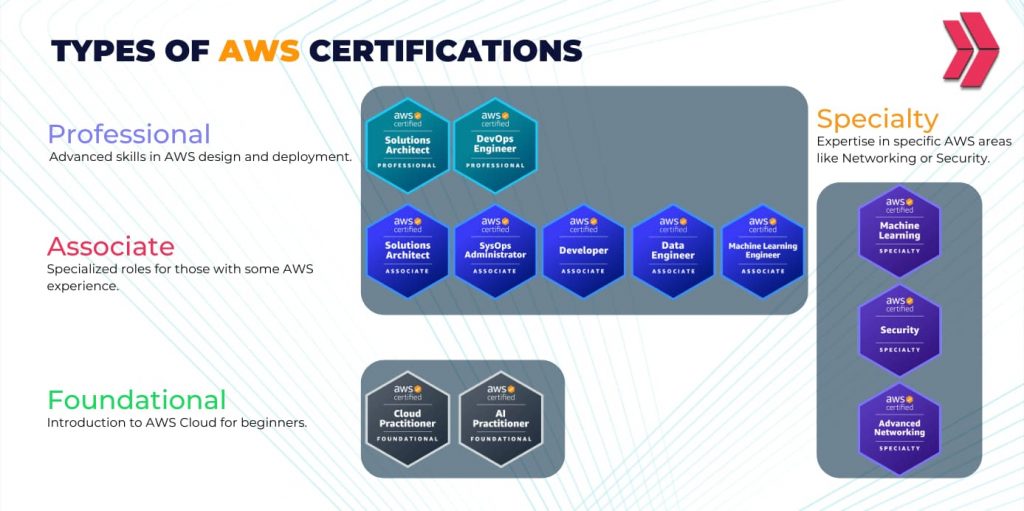
Foundational Level
The Foundational Level Certification validates an overall understanding of the AWS Cloud and does not require any prior experience.
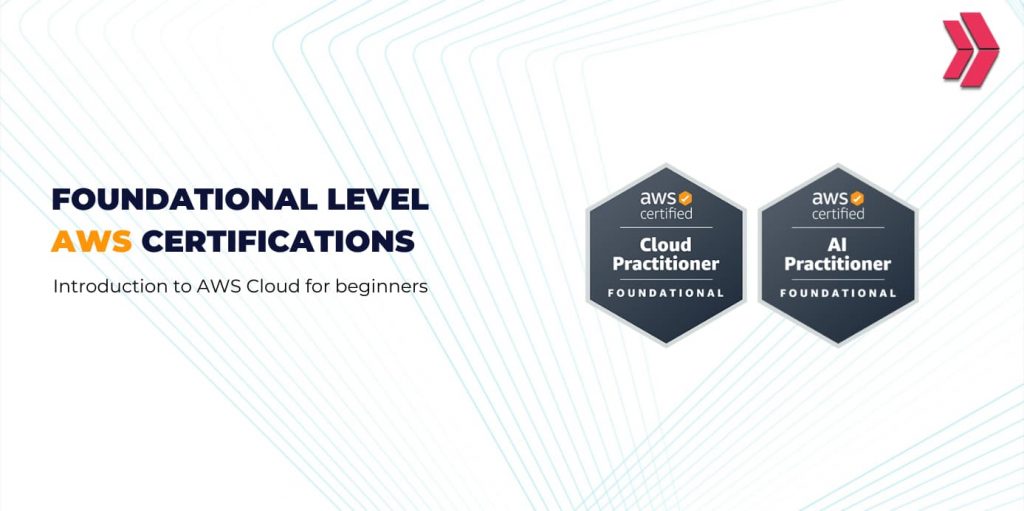
1. AWS Certified Cloud Practitioner:
Obtaining the AWS Certified Cloud Practitioner certification means understanding the AWS Cloud infrastructure, security fundamentals, and services. Additionally, achieving the AWS Cloud Practitioner Certification demonstrates a foundational knowledge of cloud concepts, AWS services, and overall cloud architecture.
- Certification Level: Foundational
- Exam Format: 65 questions, either multiple choice or multiple response
- Exam Duration: 90 Minutes
- Cost: 100 USD
2. AWS Certified AI Practitioner
The AWS Certified AI Practitioner certification demonstrates a strong understanding of artificial intelligence (AI), machine learning (ML), and generative AI concepts, along with their practical applications. It is particularly suited for professionals who engage with AI/ML technologies in decision-making or strategic planning but do not necessarily develop AI/ML solutions themselves.
- Certification Level: Foundational
- Exam Format: 65 questions
- Exam Duration: 90 Minutes
- Cost: 100 USD
Associate Level
Associate level certifications are role-based and intended for individuals who have some experience in the cloud sector. Earning Associate-level certifications demonstrates that one has reliable capabilities in the AWS Cloud. Prior cloud or substantial on-premises IT experience is recommended before attempting Associate-level certifications. Roles under this level include Solutions Architect, Developer, SysOps Administrator, and Data Engineer.
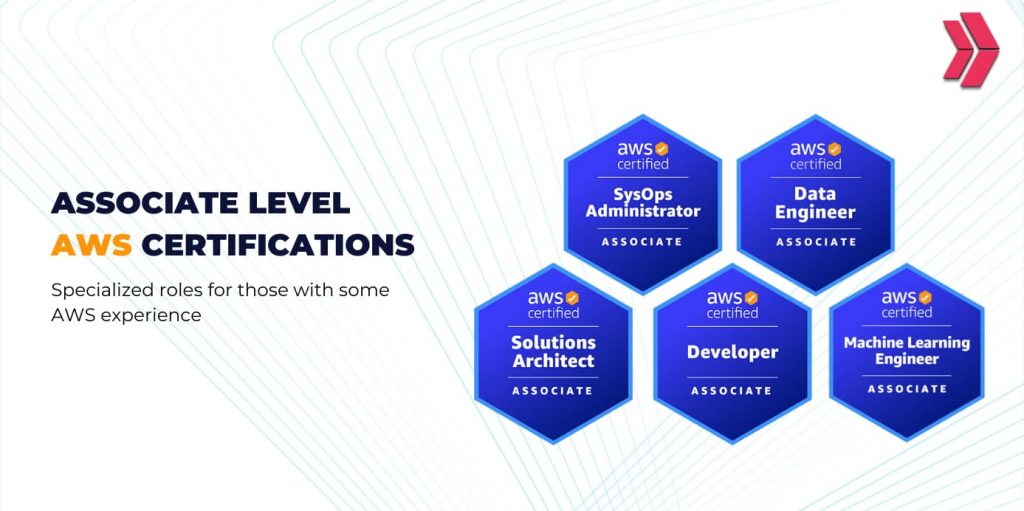
1. AWS Certified Solutions Architect – Associate:
The AWS Certified Solutions Architect – Associate certification suits those with one or more years of hands-on experience with cloud systems. It’s aimed at professionals who need to understand how to architect and deploy secure and robust applications on the cloud. Furthermore, obtaining the AWS Solution Architect Associate Certification validates an individual’s ability to design and implement distributed systems on AWS.
- Certification Level: Associate
- Exam Format: 65 questions, either multiple choice or multiple response
- Exam Duration: 130 minutes
- Cost: USD 150
2. AWS Certified Developer – Associate:
The AWS Certified Developer – Associate certification is for developers who build and maintain applications on the AWS platform, focusing on core AWS services, uses, and basic AWS architecture best practices.
The AWS Developer Associate Certification is designed for developers who want to showcase their expertise and understanding in developing and deploying applications using Amazon Web Services.
- Certification Level: Associate
- Exam Format: 65 questions, either multiple choice or multiple response
- Exam Duration: 130 Minutes
- Cost: 150 USD
3. AWS Certified SysOps Administrator – Associate:
The AWS Certified SysOps Administrator – Associate certification is designed for system administrators and those in operations roles managing AWS environments; this certification assesses the candidate’s ability to select the appropriate AWS service and deploy, manage, and operate scalable systems. Additionally, earning the AWS SysOps Administrator Associate Certification proves expertise in operational best practices and lifecycle management of AWS solutions.
- Certification Level: Associate
- Exam Format: 65 questions, either multiple choice or multiple response
- Exam Duration: 130 Minutes
- Cost: 150 USD
4. AWS Certified Data Engineer – Associate:
This certification shows skills in building and executing data solutions using AWS, making it ideal for professionals who oversee intricate data analytics duties.
- Certification Level: Associate
- Exam Format: 65 questions, either multiple choice or multiple response
- Exam Duration: 130 Minutes
- Cost: 150 USD
5. AWS Certified Machine Learning Engineer – Associate
The AWS Certified Machine Learning Engineer – Associate certification validates expertise in implementing machine learning workloads in production environments and operationalizing ML models using AWS services. This certification is ideal for professionals involved in MLOps, data engineering, and cloud-based ML deployments.
- Certification Level: Associate
- Exam Format: 65 questions
- Exam Duration: 130 Minutes
- Cost: 150 USD
Professional Level
Professional-level certifications are also role-based but are geared toward individuals looking to validate their advanced skills in designing secure, optimized, and modernized applications on AWS. These certifications require a more profound level of expertise, and two years of comprehensive AWS Cloud experience is recommended.
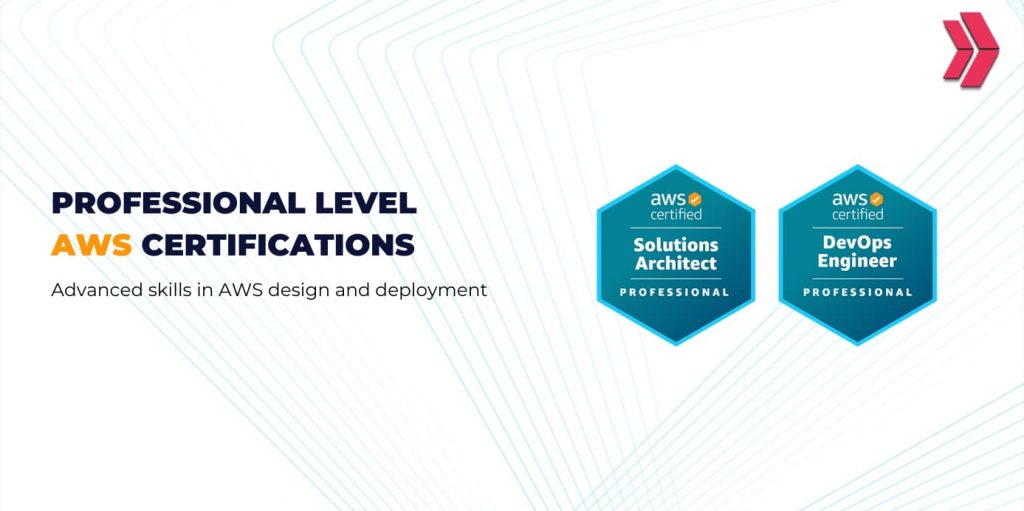
1. AWS Certified Solutions Architect – Professional:
The AWS Certified Solutions Architect – Professional certification is intended for professionals with expertise in developing and implementing highly scalable and dependable solutions. This certification necessitates advanced technical abilities and hands-on experience building distributed applications and systems on the AWS platform. Moreover, the AWS Solution Architect Professional Certification signifies a high level of proficiency in managing and operating systems on AWS, making it ideal for those looking to advance their careers as cloud architects.
- Certification Level: Professional
- Exam Format: 75 questions, either multiple choice or multiple response
- Exam Duration: 180 min.
- Cost: 300 USD
2. AWS Certified DevOps Engineer – Professional:
The AWS Certified DevOps Engineer – Professional certification is intended for qualified individuals in DevOps positions with expertise in deploying and running AWS infrastructure. Furthermore, obtaining the AWS DevOps Engineer Professional Certification demonstrates an advanced ability to manage, operate, and innovate on the AWS platform using DevOps practices.
- Certification Level: Professional
- Exam Format: 75 questions, either multiple choice or multiple response
- Exam Duration: 180 min.
- Cost: 300 USD
Specialty
Specialty certifications allow individuals to dive deeper and position themselves as trusted advisors in strategic areas of the AWS Cloud.
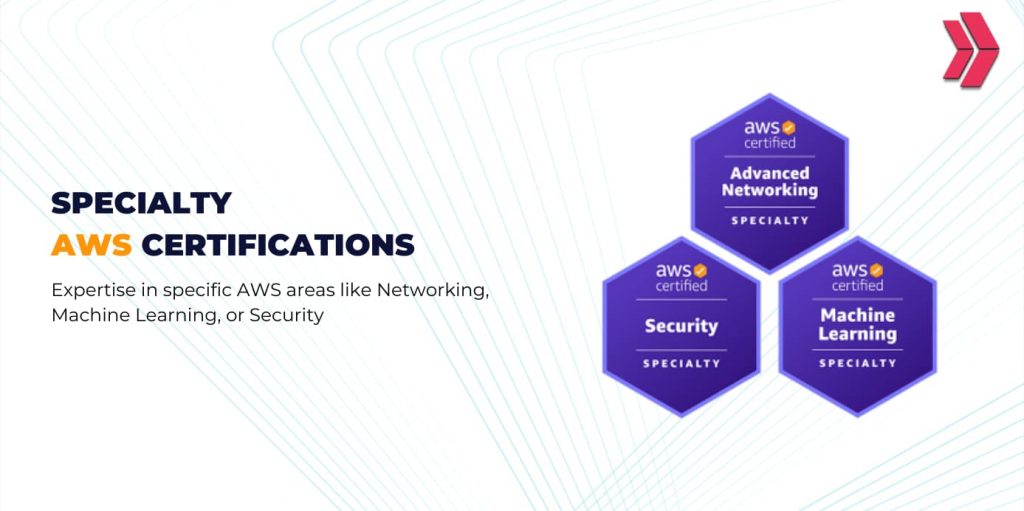
1. AWS Certified Advanced Networking – Specialty:
The AWS Certified Advanced Networking – Specialty certification is designed for those who can perform complex tasks in networking and know how to design and implement networks on AWS.
- Certification Level: Specialty
- Exam Format: 65 questions, either multiple choice or multiple response
- Exam Duration: 170 Minutes
- Cost: 300 USD
2. AWS Certified Machine Learning – Specialty:
AWS Certified Machine Learning – Specialty certification is for those who create machine learning solutions on the AWS platform, assessing the ability to design, implement, and maintain ML solutions.
- Certification Level: Specialty
- Exam Format: 65 questions, either multiple choice or multiple responses
- Exam Duration: 180 Minutes
- Cost: 300 USD
3. AWS Certified Security – Specialty:
AWS Certified Security – Specialty certification is tailored for IT security professionals to demonstrate their skills in securing AWS applications and infrastructure.
- Certification Level: Specialty
- Exam Format: 65 questions, either multiple choice or multiple responses
- Exam Duration: 170 Minutes
- Cost: 300 USD
What are the AWS Certification Paths?
AWS Certification paths are designed to align with specific cloud job roles and their associated responsibilities. Whether you are just starting out or looking to advance in your cloud career, there is a path that fits your professional goals. AWS offers 12 certifications across Foundational, Associate, Professional, and Specialty levels, each validating expertise in different aspects of cloud technology. To explore which certification is best suited for your career aspirations, check out our in-depth guide: “AWS Certification Path: Which Certificate Is Right for You?”.
What Jobs Can You Apply for with AWS Certification?
Holding an AWS certification can open the door to various in-demand AWS jobs. Certified individuals are often sought after for roles like DevOps Engineer, Cloud Solutions Architect or Cloud Engineer, Cloud SysOps Administrator, and many more. AWS certifications signal to employers that the candidate possesses the skills and knowledge necessary to work on the AWS platform, making them competitive candidates for various technical jobs.
Can You Get an AWS Job with No Experience?
Yes, you can get an AWS job with no experience by earning an AWS Certified Cloud Practitioner certification, gaining hands-on experience with AWS’s free tier, and showcasing projects on GitHub. Additionally, internships or freelance work can help develop practical skills, making it easier when getting an AWS job with no experience.
How to Prepare for the AWS Certification Exam?
Preparing for the AWS Certification Exam should begin with understanding the scope and content of the exam you plan to take. Utilizing AWS’s own training resources, including courses and tutorials through the AWS Skill Builder, is a great way to start. Additionally, hands-on practice with AWS services, studying AWS whitepapers, FAQs, and taking practice exams can significantly improve your chances of success.
For more information you can check our blog article titled “How to Prepare for an AWS Certification Exam?”.
How to Choose an AWS Course?
When choosing an AWS course, consider your current skill level and the specific certification you aim to achieve. Look for courses that thoroughly cover the exam blueprint topics and offer a mix of theoretical and practical learning experiences. Certified AWS instructors should lead classes and, if possible, include access to AWS labs for hands-on practice.
Conclusion
AWS Certifications are much more than credentials; they are a way to advance your career in the cloud computing environment. With certifications tailored to specific roles, from security to networking, you signal that you’re ready to meet the industry’s demands and showcase your expertise.
It can be helpful to attend an AWS bootcamp or AWS and DevOps course to earn these respected certifications. These programs bridge the gap between aspiring professionals and the evolving needs of the cloud computing environment by providing the comprehensive, in-depth knowledge and practical experience required to obtain AWS certification.


